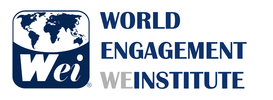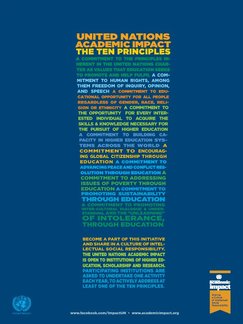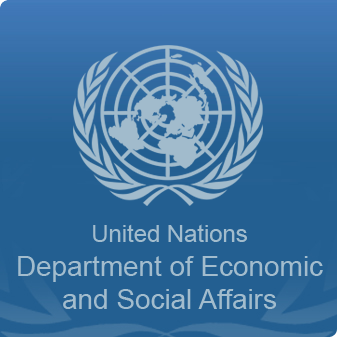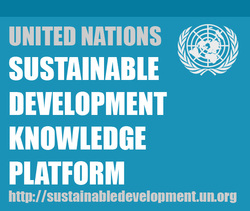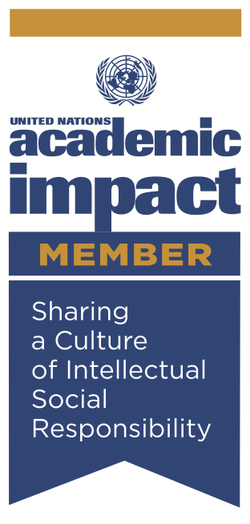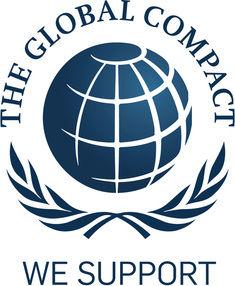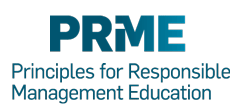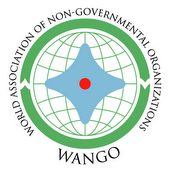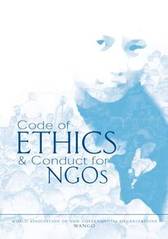|
The World Engagement Institute (WEI) is affiliated with a variety of international programs and global initiatives aligned with its mission of academic engagement, international development and institutional capacity building. Many of WEI's associates have been closely operating under the guidance and auspices of United Nations' Programs and Agencies. WEI's subject matter expertise in areas of sustainable international development and sustainable human security share a common theme with the UN mission. Examples of this are the major UN related initiatives which link academic institutions, education and cross-sector partnerships for the promotion of a new culture for social responsibility and global engagement. These programs include the United Nations Academic Impact (UNAI), the United Nations Global Compact (UNGC) and the Principles for Responsible Management Education (PRME). WEI is also a recognized NGO by the United Nations Department of Economic and Social Affairs (UN-DESA) and the United Nations Division for Sustainable Development (UN-DSD).
|
United Nations Department of Economic and Social Affairs (UN-DESA)
|
The World Engagement Institute is a member of the United Nations Department of Economic and Social Affairs (UN-DESA). The DESA NGO Branch is the focal point within the UN Secretariat for non-governmental organizations in consultative status with the Economic and Social Council (ECOSOC) and for NGOs seeking status. The office supports NGOs by informing them in a timely fashion on events and opportunities to collaborate with the United Nations. They service the Committee on NGOs, which meets twice a year to discuss accreditation of NGOs to the UN Economic and Social Council. Through CSONet, the office facilitate participation of NGOs to most of the intergovernmental processes taking place at United Nations headquarters and beyond. Each year, some 7,000 NGO representatives participate in those events in New York alone. With the support of the UN Development Account, they carry out limited capacity-building activities with civil society organizations. The NGO branch is part of the Office for ECOSOC Support and Coordination (OESC), a division of the Department of Economic and Social Affairs (DESA) of the United Nations.
Today more than 3,400 organizations have an ECOSOC consultative status at the united Nations. The Article 71 of the UN Charter opened the door by providing suitable arrangements for consultations with non-governmental organizations. The consultative relationship with ECOSOC is governed by ECOSOC resolution 1996/31, which outlines the eligibility requirements for consultative status, rights and obligations of NGOs in consultative status, procedures for withdrawal or suspension of consultative status, the role and functions of the ECOSOC Committee on NGOs, and the responsibilities of the United Nations Secretariat in supporting the consultative relationship. Consultative status is granted by ECOSOC upon recommendation of the Committee on NGOs, which is comprised of 19 Member States. Learn more >> |
United Nations Division for Sustainable Development (UN-DSD)
|
The World Engagement Institute is part of the United Nations Division for Sustainable Development (DSD). Through various activities and consultations, the Sustainable Development Knowledge Platform aims at promoting and coordinating implementation of the sustainable development agenda of the United Nations. The United Nations Conference on Sustainable Development (Rio+20) which concluded on 22 June 2012, is been considered one of the largest conferences in the history of the United Nations. Governments renewed their strong political commitment to sustainable development and to promote integration and coherence of policies and the implementation of actions in the social, economic and environmental areas. The work of the Division translates into five core functions: (1) Support to UN intergovernmental processes on sustainable development; (2) Analysis and policy development; (3) Capacity development at the country level; (4) Inter-agency coordination; and (5) Knowledge management, communication and outreach. In addition, the Division houses the SIDS Unit mandated to undertake the five core functions enumerated above in support of the further implementation of the Mauritius Strategy of Implementation of the Barbados Programme of Action for Small Island Developing States.
The Division serves as the primary UN office responsible for supporting intergovernmental processes in the area of sustainable development. These include the General Assembly and ECOSOC, the Commission on Sustainable Development and the High Level Political Forum on Sustainable Development as well as several processes launched at Rio+20. In particular, the Division is tasked with supporting member states' deliberations on the establishment of a high level political forum for sustainable development. It will also help develop sustainable development goals, as an integral part of the UN development agenda beyond 2015. The Division also supports related regional processes and follows Member States' implementation of commitments on sustainable development since the 1992 Earth Summit. Learn more >> |
The United Nations Academic Impact (UNAI)
|
The United Nations Academic Impact (UNAI) is a global initiative which aligns institutions of higher education with the United Nations in actively supporting ten universally accepted principles in the areas of human rights, literacy, sustainability and conflict resolution. UNAI is a United Nations initiative to align institutions of higher education, scholarship and research with the United Nations and with each other. In the words of United Nations Secretary-General Ban Ki-moon: “The Academic Impact aims to generate a global movement of minds to promote a new culture of intellectual social responsibility. It is animated by a commitment to certain bedrock principles. Among them: freedom of inquiry, opinion and speech; educational opportunity for all; global citizenship; sustainability; and dialogue.” (Read more here). Furthermore UNAI aims to support the realization of the Millennium Development Goals (MDGs) focusing on the reciprocal relationship between education and sustainable development. Academic institutions have an invaluable role to play in strengthening the work of the United Nations. The World Engagement Institute, in its academic-based identity and role as connector with numerous academic institutions worldwide aims to promote academic-based sustainable development, academic-social impact and international-global engagement.
The UNAI is an initiative formally launched on November 18, 2010 by United Nations Secretary-General Ban Ki-moon. During the inauguration ceremony he outlined the purpose of UNAI in these words: “By sharing ideas, across borders and disciplines, we can find solutions to the interconnected problems that cause so much suffering. Climate change is not just an environmental threat; it is closely tied to poverty. Poverty is not just about jobs, it is directly related to food security. Food security has an impact on health. Health affects generations of children. Children hold the key to our future. And education can lead to progress on all these fronts." (Read more here). Academic Impact is informed by a commitment to support and advance ten basic principles: 1. A commitment to the principles inherent in the United Nations Charter as values that education seeks to promote and help fulfill; 2. A commitment to human rights, among them freedom of inquiry, opinion, and speech; 3. A commitment to educational opportunity for all people regardless of gender, race, religion or ethnicity; 4. A commitment to the opportunity for every interested individual to acquire the skills and knowledge necessary for the pursuit of higher education; 5. A commitment to building capacity in higher education systems across the world; 6. A commitment to encouraging global citizenship through education; 7. A commitment to advancing peace and conflict resolution through education; 8. A commitment to addressing issues of poverty through education; 9. A commitment to promoting sustainability through education; 10. A commitment to promoting inter-cultural dialogue and understanding, and the “unlearning” of intolerance, through education. The World Engagement Institute aims to engage a large network of academic institutions on practical and professional international initiatives promoting international sustainable development, sustainable capacity building and sustainable human security. With its identity as "virtual" university and its operations as subject matter expert, WEI works as a catalyst for human, social and institutional transformation for the greater good of society. Its academic-centered methods provide sustainable and institutional solutions to post-conflict societies and transitional societies. Academic institutions, with their primary mission of education, research and service can play a vital role in developing engaged, value-centered and competent leaders addressing the complex problems of our globalized societies. The growing network of academic institutions partnering with WEI find inspiring and innovative international development solutions while promoting global leadership development. WEI represents the UNAI principles by promoting intellectual and academic social responsibility (ASR) not just as an ethical statement but also as a pragmatic option for world benefit. WEI serves academically-based programs and academic institutions to strategically partner in applied and policy oriented research, community and internationally engaged teaching. By formally endorsing the UNAI's ten principles, WEI makes a commitment to use education as an engine to address global problems. The UNAI partners with numerous associations of colleges and universities who endorse the principles of the Academic Impact and actively encourage their affiliated institutions of higher education to join the Academic Impact as individual members. See a list here. Connect and collaborate with other academic institutions linked to the United Nations Academic Impact (UNAI) here http://academicimpact.org and here http://outreach.un.org/unai/ Connect with the UNAI social networks here http://www.facebook.com/ImpactUN |
United Nations Global Compact (UNGC)
|
The United Nations Global Compact is a strategic policy initiative primarily designed for businesses in collaboration with civil society, academic institutions and other actors that are committed to aligning their operations and strategies with ten universally accepted principles in the areas of human rights, labor, environment and anti-corruption.
Overall, the Global Compact pursues two complementary objectives: (1) Mainstream the ten principles in business activities around the world and (2) Catalyze actions in support of broader UN goals, including the Millennium Development Goals (MDGs). There are seven United Nations agencies behind the UNGC and supporting its work. They are: the Office of the UN High Commissioner for Human Rights (OHCHR), the International Labour Organization (ILO), the United Nations Environment Programme (UNEP), the United Nations Office on Drugs and Crime (UNODC), the United Nations Development Programme (UNDP), the United Nations Industrial Development Organization (UNIDO) and the United Nations Entity for Gender Equality and the Empowerment of Women (UN Women). The United Nations Global Compact's ten principles are: Principle 1: Businesses should support and respect the protection of internationally proclaimed human rights; and Principle 2: make sure that they are not complicit in human rights abuses. Principle 3: Businesses should uphold the freedom of association and the effective recognition of the right to collective bargaining; Principle 4: the elimination of all forms of forced and compulsory labor; Principle 5: the effective abolition of child labor; and Principle 6: the elimination of discrimination in respect of employment and occupation. Principle 7: Businesses should support a precautionary approach to environmental challenges; Principle 8: undertake initiatives to promote greater environmental responsibility; and Principle 9: encourage the development and diffusion of environmentally friendly technologies. Principle 10: Businesses should work against corruption in all its forms, including extortion and bribery. The World Engagement Institute, as an academically-based non-governmental and non-for-profit organization contributes to promoting the principles and practices inspired by the UN Global Compact. Through our research, programs, projects and international partnerships we promote a integrated approach for developing institutional and leadership capacity for human rights, labor rights, environmental rights and anti-corruption. More specifically, WEI offers a variety of tools and innovative approaches for the promotion of women rights supported by institutional protection and capacity. Other correlated areas of WEI's activities, including international crime-prevention and prosecution, combating human trafficking and sustainable partnerships for international capacity development, clearly align with the Global Compact's ten principles. For additional information on the UN Global Compact and to get resources on specific issues see: http://www.unglobalcompact.org
|
Principles of Responsible Management Education (PRME)
|
The Principles for Responsible Management Education (PRME) initiative is a growing network of academic-based institutions that champion the principles (and practices) for a responsible management education, research and thought leadership globally. The PRME are inspired by internationally accepted values such as the principles of the United Nations Global Compact. They seek to establish a process of continuous improvement among institutions of management education in order to develop a new generation of business leaders capable of managing the complex challenges faced by business and society in the 21st century.
The World Engagement Institute, with its mission of developing international sustainable capacity worldwide, closely aligns with the PRME. We do so by primarily centering our professional global leadership and institutional capacity development programs on academic social responsibility and community (civil society) engagement. Our vision of developing sustainable, prosperous and secure interconnected societies clearly aligns with the PRME's mission to promote new educational and practical models for ethical leadership and engaged international management development. Most government granted or contracted international development programs are delivered by business that tend to focus on a short term delivery (output) and not much on developing sustainable models and engaged leadership for a long term impact (outcomes). WEI adheres with the purpose of PRME in the attempt to break with the international business-as-usual. The top down approach that most international development corporations often employ must change into a more culturally competent, locally-driven and regionally supported approach. The ethical audit for this new approach must be centered on building on local assets and sustainable outcomes in institutional capacity and leadership engagement. WEI recognizes that the transformation begins with new management education and practices. In the current academic environment, corporate responsibility and sustainable development have entered but not yet become embedded in the mainstream of business-related education. The PRME are therefore a timely global call for business schools and universities worldwide to gradually adapt their curricula, research, teaching methodologies and institutional strategies to the new business challenges and opportunities. Taking the Six Principles as a guiding framework, any institution which is willing to integrate corporate responsibility and sustainable development in a gradual but systemic manner is welcome to join the initiative. WEI, in accordance to its academic-based and educational approach to international development and in support of our academic partners worldwide, declare its willingness to progress in the implementation of the following Principles, starting with those that are more relevant to our capacities and mission. We will report on progress to all our stakeholders and exchange effective practices related to these principles with other academic institutions:
Read more and get connected with the Principles of Responsible Management Education (PRME) here: http://www.unprme.org |
World Association of Non-governmental Organizations (WANGO)
|
The World Engagement Institute is a supporter of the Code of Ethics and Conduct for NGOs. This is a set of fundamental principles and operational principles and standards developed by the World Association of Non-Governmental Organizations (WANGO) to help guide nonprofit and non-governmental organizations worldwide to ethically and transparently govern their operations. It is also an international NGOs enlisted in the WANGO database.
The World Association of Non-Governmental Organizations (WANGO) is an international organization uniting NGOs worldwide in the cause of advancing peace and global well being. WANGO helps to provide the mechanism and support needed for NGOs to connect, partner, share, inspire, and multiply their contributions to solve humanity’s basic problems. Initiated in 2000 by a handful of international NGOs and prominent visionaries, WANGO has quickly become one of the premier international bodies for non-governmental organizations that are committed to the ideals of universal peace, justice, and well being for all humanity. Concerned with universal values shared across the barriers of politics, culture, religion, race and ethnicity, the founding organizations and individuals envisioned an organization that would enable NGOs to work in partnership across those barriers, thereby weaving a selfless social fabric essential to establishing a worldwide culture of peace. By optimizing resources and sharing vital information, WANGO provides a means for NGOs to become more effective in completing their vital tasks. With its global network of NGOs, as well as affiliates drawn from the ranks of governmental and intergovernmental bodies, business, and universities, WANGO has become an international leader in tackling issues of serious global concern. Read more >> |
